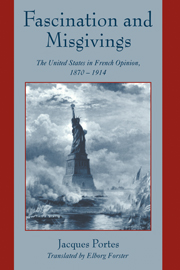4 - Les Nègres
Published online by Cambridge University Press: 07 October 2009
Summary
The term nègre, which has become derogatory today, was the one most frequently employed by French travelers in the second half of the nineteenth century. Revealing the racial conceptions of the period, it corresponds best to the American word negro and even nigger. This point needs to be made, for the existence of a large population of black race was indeed a specifically American phenomenon that forcefully struck French and other European visitors before the First World War brought more frequent contacts with black troops from Africa and America.
The sons of Ham certainly did not, or only marginally, walk the streets of Paris, and it was a rare Frenchman who had had the opportunity to travel to the French colonies in Africa or to the Antilles to meet such people. And yet French travelers, immediately upon landing in New York – amazed, not to say stunned, to begin with by the decor of the Empire City and by the vehemence of daily life – would come in contact with black people by just turning a corner, by boarding a public conveyance, and especially in the halls of their hotel and later in the Pullman cars of their trains. In most cases, this was the very first of such encounters, and it generated astonishment and many questions. If the traveler went on to Washington, not even to mention the Deep South, where such encounters became more and more frequent, there would be less astonishment but more sustained reflection.
DOUBLY BIASED OPINIONS
The Weight of the Past and the Difficulties of the Present
The French travelers' interest in the black American population had its roots in French tradition.
- Type
- Chapter
- Information
- Fascination and MisgivingsThe United States in French Opinion, 1870–1914, pp. 104 - 136Publisher: Cambridge University PressPrint publication year: 2000



